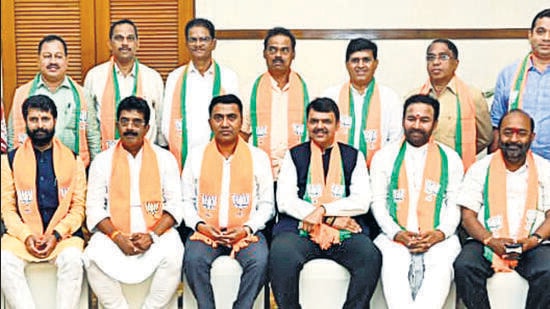Sawant set to helm Goa again, MGP extends ‘unconditional’ support to BJP
The MGP, which fought the Goa elections in an alliance with the Trinamool Congress (TMC), won two seats.
The Maharashtrawadi Gomantak Party (MGP) in Goa on Friday extended its “unconditional support” to the Bharatiya Janata Party (BJP) which is just one seat short of the majority figure of 21 in the 40-member assembly.

In the polls, the BJP emerged as the single largest party, winning 20 seats. The MGP, which fought the Goa elections in an alliance with the Trinamool Congress (TMC), won two seats. The TMC was completely rejected by voters.
While the Congress won 11 seats, two seats went to the tally of Aam Aadmi Party (AAP). Independent candidates bagged three seats. The Revolutionary Goans Party (RGP) and the Goa Forward Party won one seat each.
Briefing reporters, MGP chief Ramkrishna ‘Sudin’ Dhavalikar said the party was approached by BJP’s central leadership.
“We decided to extend unconditional support to the BJP after they assured me that they will not repeat the practice of splitting the smaller parties such as the MGP. Top BJP leaders like Union minister Amit Shah and Goa BJP desk-in-charge Devendra Fadnavis have already spoken to me,” Dhavalikar said.
Chief minister Pramod Sawant said the decision will be taken by the party high command.
“There will be different opinions on some issues. That does not mean they are real differences. Everyone has an opinion. If everybody thought the same way, the world would be a different place altogether. There are varying opinions. Ultimately… the high command, the central Parliamentary board and our central leaders will take a call. What they do is important. They feel that if a certain decision is taken, there may be more stability. They are thinking in terms of having a stable government for the next five years,” the chief minister said.
TMC leaders preferred not to comment on the MGP’s decision to support the BJP.
However, a section of the BJP’s winning candidates, led by party leader Ravi Naik, opposed the idea of an alliance with the MGP.
“I will not accept MGP support. We don’t need their support. We have the support of 23 MLAs. Some of our MLAs have already raised an objection to accepting support from the MGP,” Naik told reporters.
Naik had joined the BJP after quitting the Congress just days prior to the elections. He defeated his nearest rival of the MGP, NAME, by 77 votes in the polls.
Another BJP leader Govind Gaude, who defeated MGP’s Deepak Dhavalikar from Priol, also opposed the thought of allying with Dhavalikar’s party.
One of the independents — Chandrakant Shetye, who defeated BJP candidate and speaker Rajesh Patnekar — on Thursday publicly declared his support to the BJP. State BJP president Sadanand Shet Tanavade said the party has received letters of support from all three independent candidates.
Meanwhile, Sawant said the party has decided to wait for its central observers to arrive in the state before electing a new leader of the legislative party and stake a claim to form the government.
The chief minister, who held a meeting of his cabinet to recommend dissolution of the House on March 14, said: “For the new assembly to be constituted, you have to dissolve the present assembly. You have to make a cabinet decision, so this meeting was held,” he said.
The tenure of the present assembly is slated to end on 15 March.
“We are a central party. We had called the members of the last cabinet for a meeting and a resolution was passed to dissolve the assembly from Monday morning. The resolution will be sent to the Governor, after which the assembly will be dissolved and a meeting of fresh legislators will be held. The remaining formalities will then be completed,” he added.
Asked if he was the frontrunner for another term as chief minister, Sawant said: “You should ask the central parliamentary board of the BJP. They are the people who are going to decide.”
Cabinet minister Mauvin Godinho said there was a consensus within the cabinet “to have a good government, a government which is people-friendly and which will carry everyone together along with it”.
“The central observers will discuss and take a decision and inform us. They will also take our views into consideration on whether a change (in leadership) is required. It will be done in two to three days,” Godinho said.
“Within two to three days, everything will be over. We will have a new government in place,” he added.



